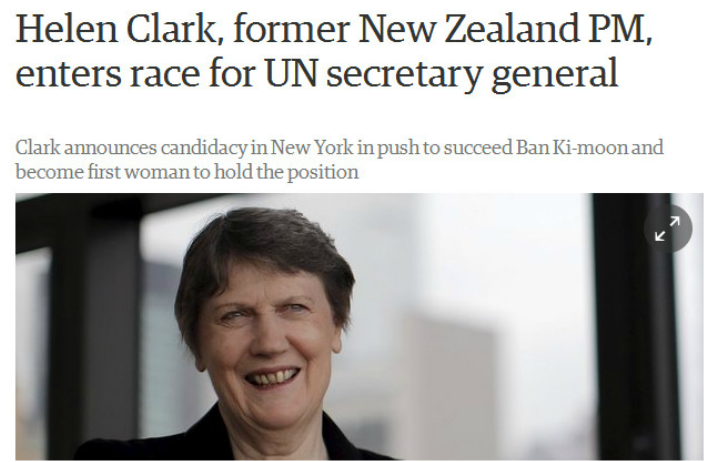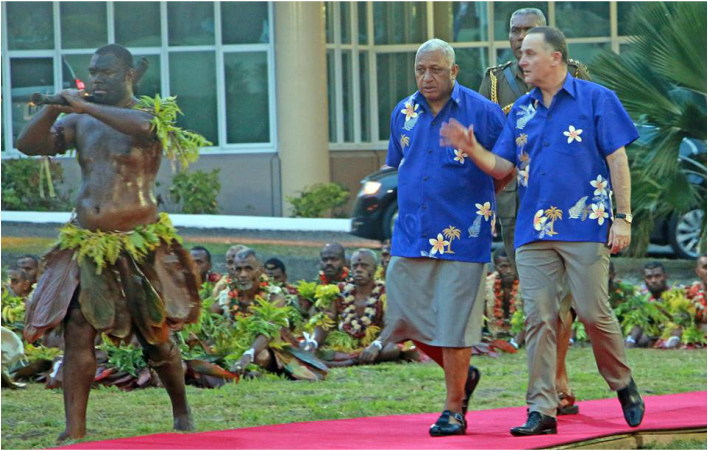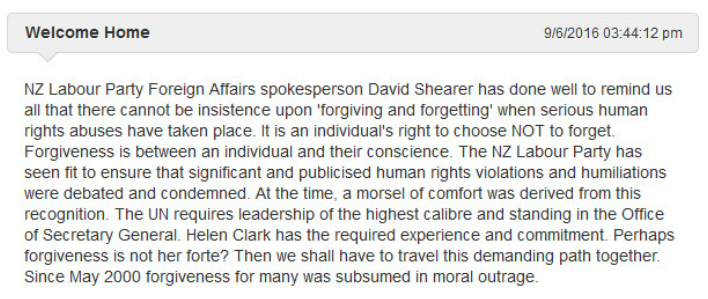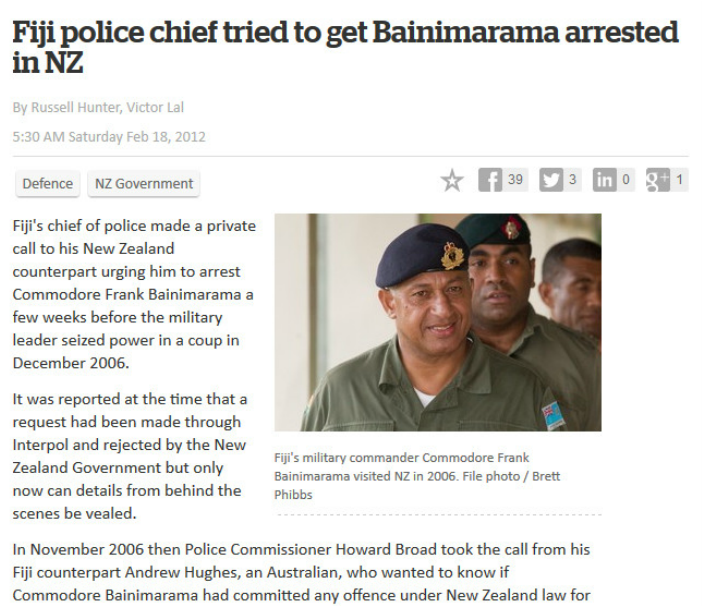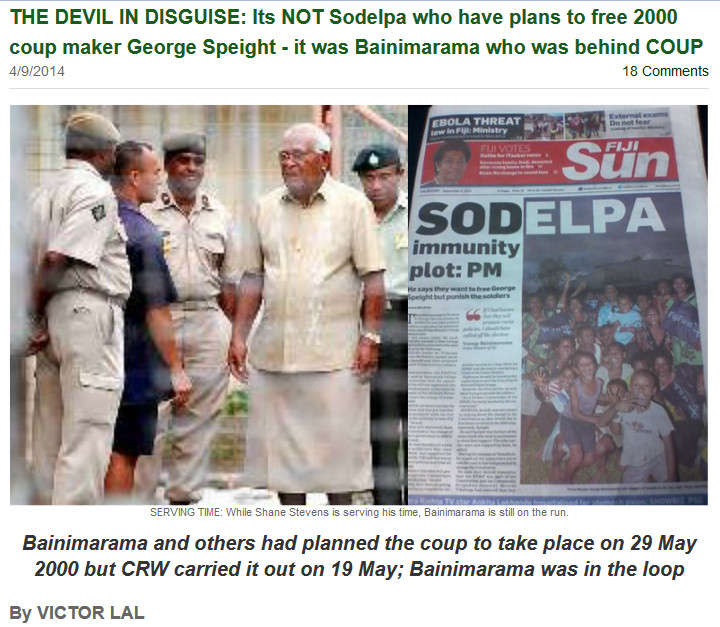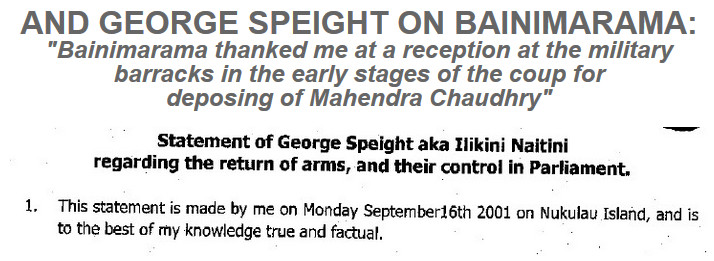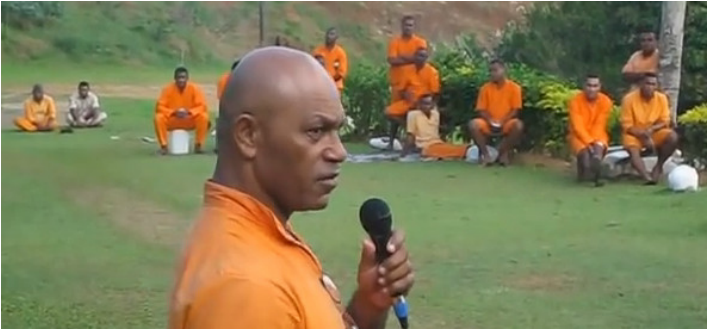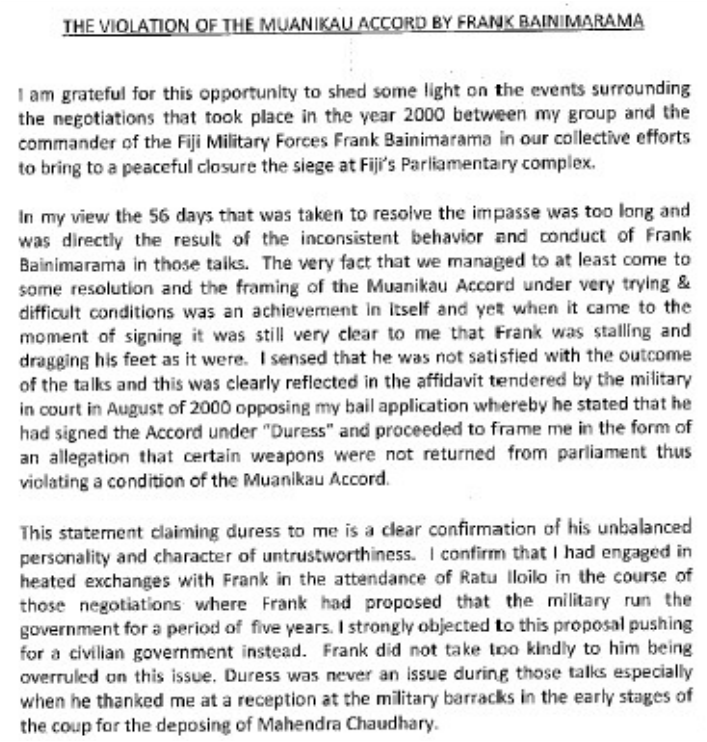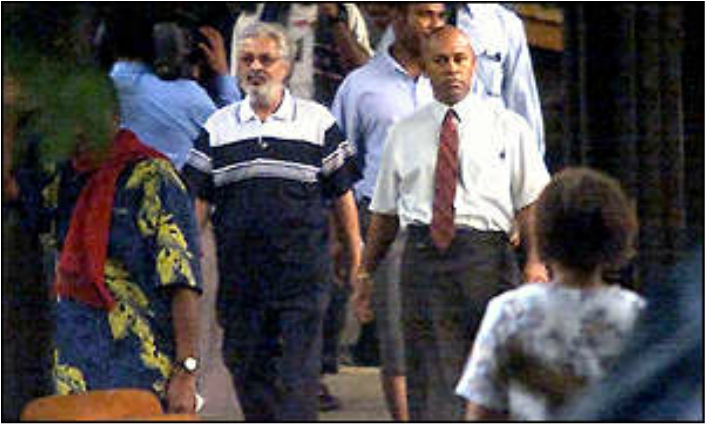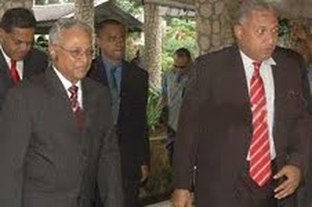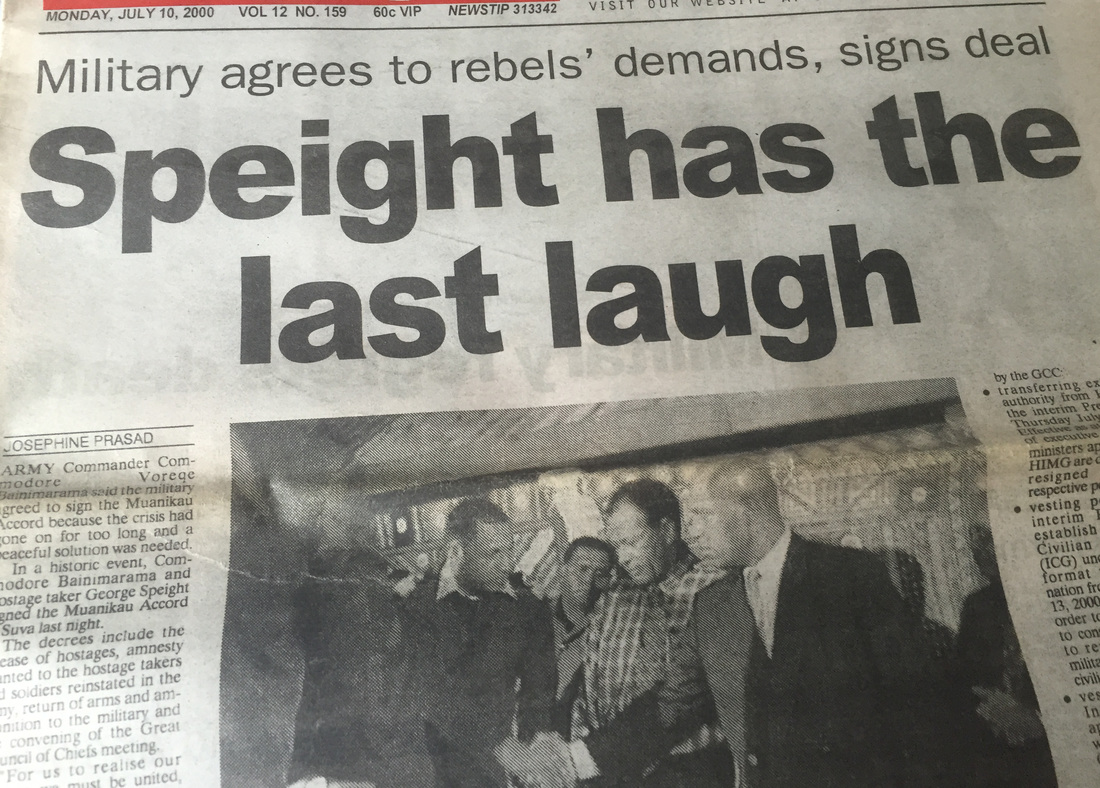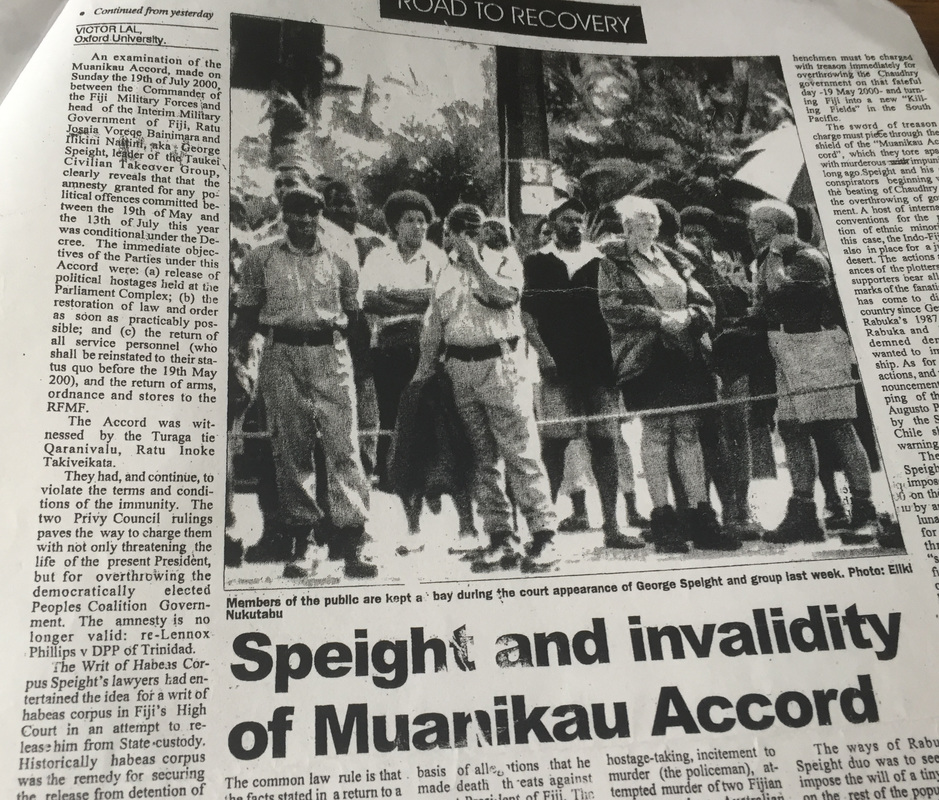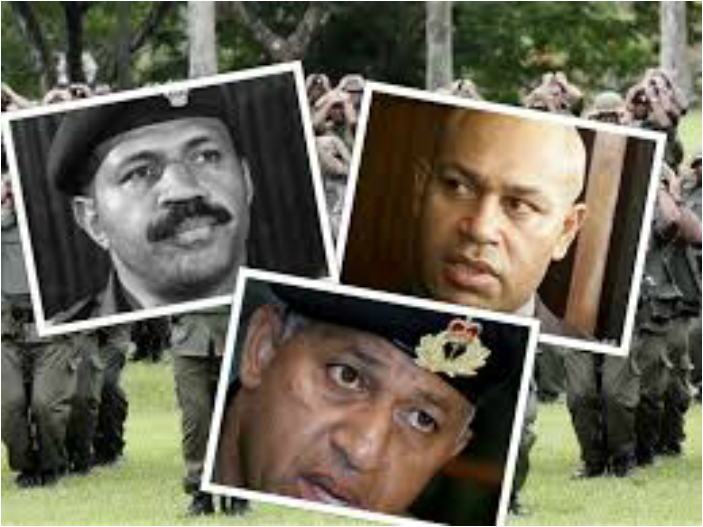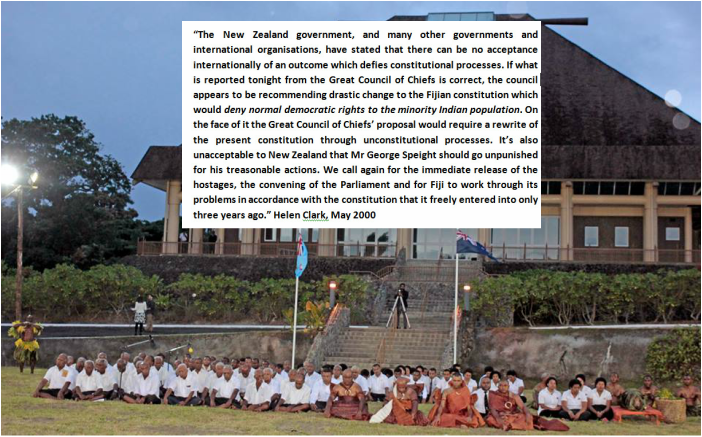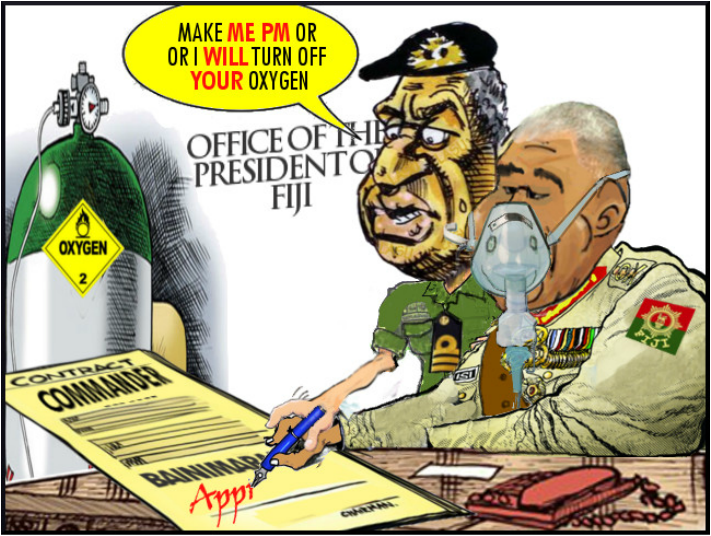New Zealand is supporting Fiji's bid for Peter Thomson, Fiji's Ambassador to the UN, to be the next President of the General Assembly and Key said he was hoping Fiji would support Helen Clark. "Frank [Bainimarama] may not be her No1 cheerleader, but I don't think he'll go out of his way to
try to undermine her."
"Frank Bainimarama could be looking for an exit strategy [to become President] because he is GUILTY OF TREASON" - Helen Clark, July 2008
“She (Clark) never understood what is happening in Fiji, and she will never want to understand what’s happening in Fiji. All she wants is this grand idea of being Lady of the Pacific and she has been very vocal against Fiji and what we have been trying to fight for, which is equality for everyone in Fiji.” -
Frank Bainimarama, calling on Indo-Fijians living in New Zealand not to vote for Clark, or the Trade Minister, Phil Goff, in the then upcoming 2008 New Zealand general election
"Well, I amused really because he is quick to complain when anyone says anything about politics in Fiji and then gets on a local radio station [Radio Tarana] and blasts away about our politics. I think we just got to have a chuckle." - Helen Clark, October 2008
* Helen Clark had said she had her doubts when Bainimarama made his promise to hold elections by March 2009. “I must say I wasn’t convinced by the assurances he gave the Forum leaders, so I wrote everything down.” | “We condemn the unlawful detention and thuggish treatment of Prime Minister Chaudhry and other members of his Government. We are particularly concerned at the physical treatment and threats that have been made against the Prime Minister and the other hostages. Mr Chaudhry and his Ministers have been subjected to severe psychological pressure and in some cases physical abuse." - Helen Clark, May 2000 |
Bainimarama had also taken a swipe at Clark in July 2008 when she said he might become the President and elect Chaudhry as Prime Minister. Clark said Bainimarama could be looking for an exit strategy because, she claimed, he was GUILTY OF TREASON
"Bainimarama is wrong. Clark always understood Fiji. Her unwavering response to the 2006 coup had been consistent with her opposition to the Speight coup. Long live the championing “Queen of Democracy in the South Pacific” – Helen Elizabeth Clark. We hope your fight for democracy and human rights will continue to ring aloud worldwide. Thank you for standing up against the coup culture in Fiji." - VICTOR LAL, 2008
"It is not surprising that when the 2006 coup happened, Clark resorted to the position she took after the 2000 Speight coup, except that this time she stood up to Bainimarama and his pro coup supporters. Earlier, she had made one last ditch attempt to bring Qarase and Bainimarama together at the meeting in Wellington on 30 November 2006. When the coup happened, she had no option but to impose sanctions and strongly denounce Bainimarama. Meanwhile, while Clark remained true to her position on the coup culture in Fiji, her former counterpart Chaudhry, went on to join Bainimarama’s interim cabinet, and later claimed that the 2006 coup was necessary to save the ailing economy." VICTOR LAL, 2008

11 November 2008
HELEN CLARK – SOUTH PACIFIC QUEEN OF DEMOCRACY
By VICTOR LAL
Cometh the hour, cometh the woman! When we were uncontrollably crying out in 2000 for democracy, human rights, constitutionalism, non-racism, sanctions, the rule of law and the re-instatement of the deposed Chaudhry government, one woman bravely stepped forward to answer our call.
Yes, she was Helen Elizabeth Clark, who had a year before, in December 1999, become the second female Prime Minister of New Zealand, and six months after Mahendra Chaudhry had won a landslide victory in the Fiji 1999 general elections.
She had, as one analyst noted, placed considerable emphasis on the promotion of human rights internationally; she had strongly supported the role of the United Nations; she had championed nuclear disarmament and restructured the New Zealand armed forces to prioritise peacekeeping; and she had vigorously promoted free trade.
At the 1999 election, the NZ Labour Party came to power as the dominant party in a minority coalition formed with the Alliance Party. No other New Zealand government, according to the analyst, has been as consistently strong in human rights.
Shortly after the Labour government came to power, its Foreign Minister Phil Goff announced that the change in government would mean a change of priorities and emphases in foreign policy, and a month later Prime Minister Helen Clark was to state that one of the new priorities would be human rights issues.
Her declaration was put to test almost immediately when George Speight and his group of Counter-Revolutionary Forces seized the year-old Chaudhry government. New Zealand responded diplomatically by cutting military ties with Fiji and banned people associated with Speight from entering New Zealand.
Meanwhile, as international condemnation of the armed takeover of Parliament continued, Clark ruled out military intervention. But her Deputy Prime Minister Jim Anderton said he wanted an examination of any bank accounts held in New Zealand by any of the perpetrators and for “Pinochet-style” prosecutions in New Zealand against those accused of human rights violations.
Clark also decided that, unlike 1987 when the South Pacific Forum, had washed its hands off Fiji, her government would not accept foreign inaction. In conjunction with Samoa, Goff initiated a Forum Foreign Ministers’ meeting in Apia to draw up a blueprint for future Forum action in similar circumstances. At the subsequent Pacific Forum meeting in October 2000, Clark led the charge for the Forum to commit itself to upholding democratic principles.
As the analyst quoted above has pointed out, unlike her Labour predecessor, she was unwilling to defer to the preference of Forum members to not interfere in the internal affairs of neighbouring states and to refrain from criticising them publicly: the so-called “Pacific Way”.
On 22 May 2000, Clark released an official statement on behalf of the New Zealand government in which she expressed concern and outrage, and deplored the “criminal actions of Speight’s group”.
“We condemn the unlawful detention and thuggish treatment of Prime Minister Chaudhry and other members of his Government. We are particularly concerned at the physical treatment and threats that have been made against the Prime Minister and the other hostages. Mr Chaudhry and his Ministers have been subjected to severe psychological pressure and in some cases physical abuse. Mr Chaudhry at one point collapsed. He has now been seen by a doctor. Mr Speight has repeatedly declared that any attempt to release the hostages by force would result in casualties and that Mr Chaudhry and Koila Mara, Minister of Tourism and Ratu Mara’s daughter, would be the first to be killed,” said Clark.
Clark sent a message to President Ratu Mara conveying the support of all New Zealanders, adding, “The New Zealand Government strongly believes that it is within [1997 Constitution] that the current political crisis must be resolved. No-one in the international community is prepared to endorse a takeover coming from the barrel of a gun.”
While recognising that it was purely a hostage crisis, she declared that if the situation degenerated to the extent that the lives of New Zealanders (some 3000 visitors and 400 residents) were threatened, she had contingency plans in place using both civilian and military aircraft and ships.
Three days later, on 25 May 2000, on learning of the Great Council Chief’s proposal for resolving the hostage crisis, she condemned it outright, claiming the GCC’s proposal appeared to be unconstitutional. “The New Zealand government, and many other governments and international organisations, have stated that there can be no acceptance internationally of an outcome which defies constitutional processes. If what is reported tonight from the Great Council of Chiefs is correct, the council appears to be recommending drastic change to the Fijian constitution which would deny normal democratic rights to the minority Indian population,” the official statement said.
“On the face of it the Great Council of Chiefs’ proposal would require a rewrite of the present constitution through unconstitutional processes. It’s also unacceptable to New Zealand that Mr George Speight should go unpunished for his treasonable actions. We call again for the immediate release of the hostages, the convening of the Parliament and for Fiji to work through its problems in accordance with the constitution that it freely entered into only three years ago,” Clark said.
After Chaudhry was released from Parliament, Clark announced that New Zealand would continue to exert pressure on Fiji. She reassured deposed Prime Minster Chaudhry in Wellington that her country would maintain its pressure for a return to democracy in Fiji. The reassurance was made when she was meeting with Chaudhry at the Beehive, the headquarters of the New Zealand government. During the Wellington meeting in 2000, Chaudhry gave Clark a full briefing about Fiji’s situation.
He told her that he was pleased with the sanctions against Fiji which New Zealand had put in place so far, but firmer actions may be needed if the Fijian authorities did not set an acceptable timetable for a return to democratic rule. Clark later said Chaudhry’s message was that international pressure was vital.
Before the meeting, Clark told local reporters that it would be helpful if legal action was taken against the coup leader George Speight, who was being held by the Fijian military. But, she added, the situation there was still worrying. She said the sanctions New Zealand had in place would remain, and wider trade sanctions would be considered only if the situation in Fiji deteriorated substantially.
Clark called on Fiji to return to democracy as soon as possible, saying her country would give “the strongest support to those who support the restoration of democracy”. “We have drawn the line under our relationship with Fiji, which is now cool, distant and formal,” she said. On his arrival in Wellington, Chaudhry had told the waiting reporters that Speight would be charged with treason. Chaudhry said he was grateful for New Zealand’s tough stance and smart sanctions against Fiji. He said he would urge New Zealand to toughen its sanctions against his coup-torn country if it failed to return to democracy swiftly.
As already noted, at that time New Zealand sanctions against Fiji included cutting military ties, cutting aid and banning the 2000 coup plotters from travelling to New Zealand.
And when, in August 2000, Speight was finally charged with treason, Clark welcomed the treason charges. “Charging Speight and his supporters with treason is a necessary step on the long road back to restoring Fiji’s international reputation,” she told reporters.
Moreover, when in 2001, Justice Anthony Gates ruled that the government of the deposed Prime Minister should be reinstated because the interim government set up by the military after the coup was unlawful and unconstitutional, Clark again spoke saying the judgment was a signal to Fiji to hasten its return to democracy. “The sooner the government, unconstitutional as it is in Fiji, comes up with a clear timetable to return to constitutional democracy, the better,” she said.
As we are acutely aware, Commodore Frank Bainimarama refused to restore Chaudhry as Prime Minister. In his High Court affidavit, Bainimarama, as a witness in support of the Interim Qarase government, stated that he had abrogated the 1997 Constitution because he was satisfied that people engaged in the events of May 2000 were of the perception that the [1997] Constitution had watered down the interests of taukei Fijians.
Meanwhile Chaudhry, whom President Ratu Josefa Iloilo had dismissed after the end of the hostage crisis, berated the President: “The constitution requires the President to be appointed by the Great Council of Chiefs in consultation with the Prime Minister. In the next questionable move Ratu Josefa Iloilo, placed in office after the coup and who the Appeals Court declared to be in an acting capacity only, convened a meeting of the Great Council of Chiefs, and got himself appointed President.”
What all these events clearly meant, he claimed, was that Fiji’s post-coup authorities had no respect for the rule of law.
It is not surprising that when the 2006 coup happened, Clark resorted to the position she took after the 2000 Speight coup, except that this time she stood up to Bainimarama and his pro coup supporters. Earlier, she had made one last ditch attempt to bring Qarase and Bainimarama together at the meeting in Wellington on 30 November 2006. When the coup happened, she had no option but to impose sanctions and strongly denounce Bainimarama.
Meanwhile, while Clark remained true to her position on the coup culture in Fiji, her former counterpart Chaudhry, went on to join Bainimarama’s interim cabinet, and later claimed that the 2006 coup was necessary to save the ailing economy. He also took a swipe at Clark in July when she said Bainimarama might become the President and elect Chaudhry as Prime Minister. Clark said Bainimarama could be looking for an exit strategy because, she claimed, he was guilty of treason.
She said it was possible he might try and seize the presidency. “There’s someone in that position at the moment, perhaps that is the next stage of the coup,” she said.
Clark said she had her doubts when Commodore Bainimarama made his promise last year to hold elections by March 2009. “I must say I wasn’t convinced by the assurances he gave the Forum leaders, so I wrote everything down,”” she said. Responding, Chaudhry said, “Ms Clark should just worry about her party winning the elections next November instead of worrying about Fiji”.
In August, Clark said if Fiji carried through with its threats to walk out of the Forum, it risked losing significant aid and development funding. However, Chaudhry who had resigned as finance minister in the interim government said the Forum would suffer more than Fiji if it was suspended and said it was time island states took an “assertive position” to ensure they were not “pushed around” by New Zealand and Australia. “I don’t think in the long term Fiji has much to lose if it’s not a member of the forum. I myself had reservations about the usefulness of the forum,” he said.
Although Clark lost the recent election, her dignified exit as leader of her losing party should be a lesson for Chaudhry who declined to step down despite losing two consecutive general elections. And to those Indo-Fijians in New Zealand who might have responded to Bainimarama’s call to vote against Clark, whom he accused of wanting to be the “Queen of the Pacific”, they forgot that it was not Bainimarama but Clark who stood up for Indo-Fijian and Chaudhry’s birth and democratic right to govern Fiji after the High Court had ruled in 2001 in favour of the Chaudhry government.
In his message to NZ Indo-Fijians, Bainimarama told them recently: “She (Clark) never understood what is happening in Fiji, and she will never want to understand what’s happening in Fiji. All she wants is this grand idea of being lady of the Pacific and she has been very vocal against Fiji and what we have been trying to fight for, which is equality for everyone in Fiji.”
Bainimarama is wrong. Clark always understood Fiji. Her unwavering response to the 2006 coup had been consistent with her opposition to the Speight coup. Even Chaudhry had pointed out in the FLP’s “Activities Report 1999-2001: “New Zealand Prime Minister Helen Clarke denounced Speight as a failed businessman, crook and fraud who was to have appeared in court that day to answer to charges of fraud.”
In a cruel twist of irony, although Clark had failed to restore Chaudhry as Prime Minister of Fiji after the 2001 High Court judgment, she supported another descendant of Indian indentured labourer, the New Zealand born Anand Satyanand, become the Governor-General of New Zealand in August 2006. He was appointed by Elizabeth 11, Queen of England and New Zealand, on the advice of Prime Minister Clark.
Long live the championing “Queen of Democracy in the South Pacific” – Helen Elizabeth Clark. We hope your fight for democracy and human rights will continue to ring aloud worldwide. Thank you for standing up against the coup culture in Fiji.
The views expressed are those of Victor Lal and not that of Fiji Sun. E-mail: [email protected], 11 November 2008

NZ Labour Party's Foreign Affairs spokesman David Shearer
June 08, 2016
When Prime Minister John Key visits Fiji this week, polite but firm messages need to be delivered, says Labour’s Foreign Affairs spokesperson David Shearer.
“Fiji has clamped down on its own media, several New Zealand journalists are banned from visiting the country and there have been issues with the functioning of its parliament.
“Just last Friday a prominent opposition MP was banned from parliament for two years by the Privileges Committee – dominated by the governing party – for simply calling a minister a ‘fool’, a disproportionate penalty.
“All of these factors point to a Fiji that still has some way to go before we can call it a healthy democracy.
“John Key has reportedly described the aftermath of the 2006 military coup as ‘ancient history’. But it was less than two years ago they finally had democratic elections. This smacks of him sweeping eight years of military rule endured by the people of Fiji under the carpet.
“New Zealand has always stood side by side with Fiji and has a warm, close friendship with its people. We sent aid flights, a supply ship and our service people to Fiji in response to Cyclone Winston. In emergencies such as these, it’s important to stand by our friends.
“That’s all the more reason to speak up when things aren’t right, rather than looking the other way.
“New Zealanders need to be assured that John Key’s trip will include meetings with human rights organisations, media representatives and opposition parties.
“If the Prime Minister visits Fiji pretending nothing’s happened and everything’s fine, he will be doing a huge disservice to all the people working to bring a free media, democracy and human rights to Fiji,” David Shearer says.
